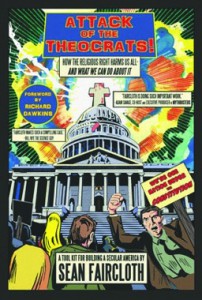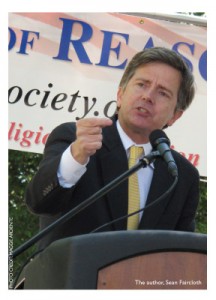Attack of the Theocrats! How the Religious Right Harms Us All—And What We Can Do About It

A friend recently passed on a slick magazine to me published by a religious right group. The cover depicted a close-up shot of a large steamroller under dark and threatening skies. The headline read, “Secularism: Can It Be Stopped?”
Let’s hope not! Secularism—and by that I mean primarily secular government—is the platform upon which religious and philosophical liberty rests. We will not be a free nation without it.
Sean Faircloth understands this. If you missed his book, Attack of the Theocrats!, when it came out in hardback, you can now pick it up in the new paperback edition. Not only is it cheaper, the paperback has a much better cover.
Thankfully, what’s between the covers remains the same—and it’s good stuff indeed. Faircloth, former executive director of the Secular Coalition for America and currently director of strategy and policy for the Richard Dawkins Foundation for Reason and Science, writes with real passion. His lively text zips right along, and before you know it you’ve finished this short book. You’re a better person for it.
We hear a lot about the “war on religion” these days. Attack of the Theocrats! is a much-needed response to those inflated claims. Far from warring on religion, U.S. laws and customs favor religion, as Faircloth points out in example after example, and this has not been good for us.
Among the most valuable chapters in the book is the third, titled “Religious Bias in Law Harms Us All.” Here, Faircloth explains how our culture’s predilection to favor religion hurts Americans.
Some examples: Young people are taught nearly useless “abstinence only” programs in public schools instead of comprehensive sex education. Religious child-care centers in many states are free from sensible regulations designed to protect children. In other states, faith-healing parents watch their children die painful deaths and are not punished. Televangelists snatch up mansions, send hastily ordained relatives to live in them and demand clergy housing exemptions from the IRS. No one blinks. People with terminal illnesses are made to die slow and painful deaths because of religious objections to death with dignity laws.
Faircloth writes with genuine conviction. His discussion of children who have died due to faith healing will test your stomach—and it may spur you to action. In a discussion of religion’s long attempt to control human sexuality, he lays out the case against religious justifications for laws in an amusing yet instructive way.
“Assume that I proposed to take away another citizen’s human rights, and that I justified taking away those rights by referring to, let’s say, an ancient, one-thousand-year-old parchment from, say Romania,” Faircloth writes. “You’d say that’s an absolutely wacko justification for denying human rights. However, if I change the hypothetical to a two-thousand-year-old document from the Levant and, if I further assert that this two-thousand-year-old document has supernatural powers, then the politicians fall over themselves bowing low and deep in subservience. How utterly medieval—yet widely accepted in the twenty-first century.”
 But he does more than just carp. Faircloth outlines a long-term strategic plan that, while it may sound lofty, contains a wealth of specific proposals. Expanding the movement, Faircloth writes, is crucial. He calls for the formation of a coalition that consists not only of secularists but of anyone who appreciates secular values. These include scientists, lesbian-gay-bisexual-transgender activists, librarians, women’s right advocates, civil libertarians, and others.
But he does more than just carp. Faircloth outlines a long-term strategic plan that, while it may sound lofty, contains a wealth of specific proposals. Expanding the movement, Faircloth writes, is crucial. He calls for the formation of a coalition that consists not only of secularists but of anyone who appreciates secular values. These include scientists, lesbian-gay-bisexual-transgender activists, librarians, women’s right advocates, civil libertarians, and others.
He also calls for a political component. This has been a long-sought goal of the secular movement, and Faircloth believes it’s in reach. He points to a model: the LGBT community. “In 1972,” Faircloth observes, “the ‘mainstream’ deemed gay people as little more than perverts to be shunned. Hard work—and major giving—changed the perception and thus the reality. You may have heard this rumor: politicians want money. We will craft a separate and targeted investment strategy in electioneering, creating an appropriate organization for this purpose.”
Much has been written lately about the current state of the godless in the United States. Recent polling data shows an increase in those who identify their religion as “none.” Many of these people are not atheists. They may believe in some higher power but can’t find (or don’t want to find) a spiritual home among the established faiths.
The challenge, as Faircloth keenly perceives, is to persuade these people that secular government is what makes their spiritual journey possible. It’s here that Faircloth shines. America’s new secular coalition, he asserts, should not only consist of nontheists but rather all those who benefit from secularism.
That’s a lot of people. To bring them on board, we need to first explain why secularism is good and why we need to stop running from the religious right’s depiction of secularism as a steamroller that flattens everyone’s rights. Yes, it’s time to embrace the steamroller, because the only people it will stop are the theocrats who want all of us to live under their religion. They deserve to be metaphorically flattened because their agenda is fundamentally against human rights.
Point of disclosure: I know Sean Faircloth and consider him a friend. But I’m not recommending Attack of the Theocrats! because I like the guy. I’m recommending it because it meets my test for what makes a good book: it’s well written and contains useful information. (And the new cover really is much better.)
Get a copy of Attack of the Theocrats! Climb aboard the steamroller for a ride into America’s bright, secular future.
